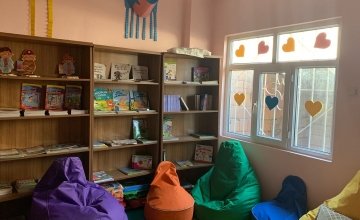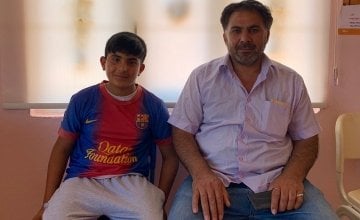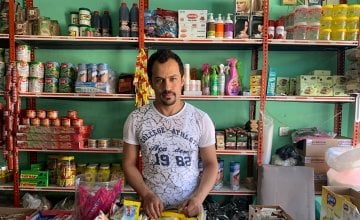
Read our 2023 annual report

Knowledge Hub
Back to school brings major challenges for Syrian children

As children in Ireland prepare to go back to school this week, getting access to education continues to be a challenge for thousands of Syrian children living in Turkey.
Amid the upheaval of conflict, it is often children who feel the greatest impact.
Forced from their homes and living in strange and uncertain surroundings, the day-to-day realities of life are left behind and this often includes access to education.
Rather than attending school and building a positive future, children are frequently left with no choice but to work to help support their families - a decision that can have repercussions for the rest of their lives.
This was the case for 14-year-old Fadi, whose family moved to south-east Turkey to escape the ongoing violence in Syria. With his family suffering from ongoing financial difficulties, he began to work with father Hassan in a bakery for up to seven hours a day but he secretly dreamt of returning to school to learn and play with his friends.
“I didn’t like working that much, I wanted to go to school."
His father Hassan, worried about how he and his family were going to make ends meet, believed that children should work as soon as they were old enough but when he enrolled Fadi in a psychosocial support programme operated by Concern, one of the facilitators pointed out the importance of education for the young teenager.
“For us, we have always believed that a child can work as soon as he’s big enough. We weren’t thinking of how the child feels,” said Hassan.
Changing attitudes
Hassan himself also enrolled in a Caregivers Engagement programme, a scheme funded by European Union humanitarian aid and run by Concern, to address the reasons why up to 40% of Syrian children in Turkey are not attending school.
These reasons can include everything from the need for children to work and support family income, low literacy rates and missed years of education, fear or lack of interest in school and an absence of school transportation services.
As part of the Caregivers course, Syrian families come together to share experiences and discuss how to support their children's development, wellbeing and learning.
It has had a huge effect on Hassan and his family, with the father-of-seven revealing that it changed his relationship with his children for the better.
“To be honest, I thought the sessions were going to be empty time, you know. I wanted to work and earn money instead. But the opposite was true, I benefited a lot.
“I did change my behaviour with my children because of the course. When one of them was upset or uncomfortable, I talked to him instead of hitting or shouting, or telling him to go away. You have to understand why he is feeling or acting this way. They are comfortable with me, they feel close to me and come to sit beside me because they are not afraid and they feel I understand them. I take time with them.”

Fadi is now excelling in his studies at a Turkish public school, where he says his favourite subjects are maths and art. He now dreams of becoming a teacher and Hassan is hugely proud of his progress.
“He has Syrian and Turkish friends, and his Turkish language is excellent - he can even write. I attend all the meetings and events at school, and I talk with his teachers to see how he is doing.”
“I swear, education is the most important thing. All parents should care about the education of their children. I am not educated. I only reached sixth grade… I can’t read or write so I didn’t have this idea in the past. But seeing my child learning, it’s another world.”
A lost generation
Hassan is just one of 435,000 Syrian refugees who lives in the Sanliurfa Province of Southeast Turkey, with over 46% of these aged 18 and under.
The fear of these children becoming a ‘lost generation’ with little hope or opportunity looms large in many Syrian communities but opportunities like the Caregiver Engagement programme empower parents to ensure that their children will prosper in the future.
With support from the European Union, Concern has engaged 664 family members, caregivers and community members to complete the course in three provinces in the region.
While he doesn’t yet have any children himself, shopkeeper Bassam recently got married and decided to undertake the course so that he would be ready to support his new family.
“When I heard about the course from a friend, I thought, well, I need to prepare myself for the future. When I have children, I want to raise them right.”
Though Bassam expected to cover some of the topics that are a part of the course, such as the effects of child labour on development and child labour law in Turkey, he was surprised that the experience made him consider some of his actions in a new light.

“I started to think about things I did in a different way… like in my family when children make mistakes, we usually hit them. This is very common. But now I try to discuss their mistakes with them instead.”
He adds that he immediately came home to discuss the things that he learned in the course with his wife and is excited by the opportunities that could be open to their child.
“The thing that surprised us the most was that children can learn so many languages. We used to think they can only learn Arabic, but when they are young, they can learn so many more - Arabic and Turkish and English all at once.
“If my child has a talent or enjoys something, like playing music or writing, me and my wife can encourage this. I know legally in Turkey that a child under 15 can work eight hours a week but I can’t accept this for my kids."
"A child should spend his life as a child… he has a long time to be working later.”
Building for the future
This knowledge of the capabilities of children and the importance of creative development was also a key turning point for father-of-four Amer, who left Syria seven years ago to move to Turkey.
While his children are now aged between 11 and 19, he is the principal of a school in one of the refugee camps in the region and guides the education of over 1,000 young Syrian students.
“We don’t know what our future is… we don’t have Turkish citizenship or Turkish language. As an educator, I joined the Caregiver Engagement course hoping that it would address the reasons children drop out of school, or what might help motivate them.”
Despite being previously experienced as an educator, Amer says that his eyes were opened by the things that he learned on the course.
“I used to give children games above their level in order to try to motivate them, but I learned that games and play should be appropriate to age and level. I also never cared about art and music - my priority was science and math - but I learned that these are important for children’s development. I actually used information from the course during this year’s Children’s Day celebration at school.”
Amer proudly plays a video of a music party on his phone, explaining that he and the other teachers also added games, a dance party and art activities to the celebration, inviting parents to attend as well.
He highlights the importance of parent engagement at his school, inviting families for parent meetings and making sure they are involved in their children’s education.
“The most important thing is for families to learn about the child and listen better. Children are growing, they are not always right and not always wrong. We should listen to children and their opinions and respect their choices.”
Working together
With the European Union’s support, 664 family members, caregivers and community members have completed the Caregiver Engagement course operated by Concern Worldwide in three provinces of Southeast Turkey.
Find out more about our work in education by clicking the link below.
Our impact in 2023
people reached through our emergency response
people reached through our health interventions
people reached through our livelihoods programmes




